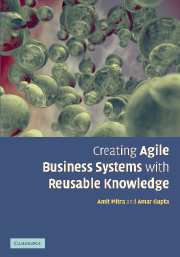Book contents
- Frontmatter
- Contents
- List of boxes
- List of figures
- List of tables
- Foreword
- Preface
- Acknowledgements
- Introduction
- 1 On the nature of reality and the nature of business
- 2 The object at the root of it all
- 3 The nature of attributes
- 4 Domains and their expression
- Appendix: Key shared components of knowledge
- Bibliography
- Index
Preface
Published online by Cambridge University Press: 11 September 2009
- Frontmatter
- Contents
- List of boxes
- List of figures
- List of tables
- Foreword
- Preface
- Acknowledgements
- Introduction
- 1 On the nature of reality and the nature of business
- 2 The object at the root of it all
- 3 The nature of attributes
- 4 Domains and their expression
- Appendix: Key shared components of knowledge
- Bibliography
- Index
Summary
Why this book? – Because it is a book begging to be written. The real world is chaotic and never stands still. Businesses constantly strive to re-invent themselves under continual, and often intense, pressures of competitive, regulatory, and technological change. The pivotal issue in business computing lies in incorporating new learning in automated information systems; adding to what is already known and adapting automatically as perspectives and priorities continually change. This is the challenge for which we have sought the answers presented in this book.
Where did it all start? It was 1992. One of the authors was the Chief Methodologist for the American International Group, an unusual global corporation that believed in turning on a dime. The firm needed a systems development discipline to facilitate nimble and innovative business practices. Thus a truly exciting and wonderful journey began – a journey we want to share with you. In this book, you will find readily usable patterns and models you can leverage to establish business requirements, object models, and knowledge bases to support the agile and exacting business needs of the twenty-first century. You will also find the exciting and simple beauty of a framework that is the direct bridge between business process engineering and systems engineering. Yes, it is a proven framework that works for every industry and business application we have tested it on – from telecommunications to insurance, from financial services to manufacturing.
- Type
- Chapter
- Information
- Creating Agile Business Systems with Reusable Knowledge , pp. xvii - xviiiPublisher: Cambridge University PressPrint publication year: 2007

